| An Alternative For the Maestro. Ruth Rondas |
| |
Abstract
For some decades, higher instrumental education has been conducted through one-to-one tuition: a student is initiated in playing an instrument by a teacher, an expert. In literature concerning instrumental education, the pedagogical skills of this expert are often depicted rather negatively. Persson (1994, 1996a, b, and c, 2000, 2004), Jorgensen (2000) and Rostvall & West (2003) refer to these teachers as ‘maestros’. Is this an accurate depiction?
This article describes the characteristics of the maestro according to Persson (1993) by analyzing the characteristics of one instrumental music teacher. Using the triadic educational theory, we attempt to map this instrumental teacher's classes and try to verify to what extent the term ‘maestro’ applies to the instrumental teacher. A more positive designation for the expert teacher in music education is being developed and proposed with reference to craftmanship.
|
|
|
The Ideology of Effectiveness and its Impact on Education in Europe. Roger Standaert
|
| |
Abstract
By 2050, the unification of Europe will certainly be covered in history manuals. At the moment, 28 European countries are in the middle of a process of Europeanisation. Due to the diversity of the European nation states’ cultures and languages, the process is difficult and time-consuming. However, in the meantime, the expanding Europe has gradually become an important stakeholder in the legislation of the nation states. In many cases, it concerns legislation with an economic scope. It may be that cultural and educational matters will also be subject to interventions by European institutions, partially as a derivative of their economic influence. At the same time, Europe extends its influence to other cultures and civilisations around the world. In turn, Europe’s culture is influenced by world culture, especially in the domains of economy, climate sciences and conflict handling. My contribution will consist of three elements. In the first instance, I will explore how I see globalisation as a layered mechanism within the context of educational goals and objectives. Secondly, I will attempt to trace the consequences of such a perspective for a European education policy in connection with the member states. In the third and final part, I will make an educated guess as to the position of the EU within the global world.
|
|
| Between Ideal and Reality: Reflections on the Desirability of a Social Mix at School. Elias Hemelsoet |
| |
Abstract
The debate on cultural and socioeconomic diversity in our schools can look back on a long history. Opinions diverge as to which causal factors account for unsuccessful school careers. Yet support is growing to seek solutions for prevailing problems in terms of a social mix. The existence of segregated schools goes against a longstanding ideal according to which each school reflects the diversity present in society. Based on in-depth ethnographic research, this article examines the potentially added value of pursuing a social mix, arguing from the case of Roma children in Ghent schools. While other research provides both arguments in favour of and opposed to a social mix, it is argued that positive or negative effects of segregated schooling do not provide a straightforward answer to whether a social mix is desirable or not. From a fundamental educational perspective, an in-depth insight in what matters to people and reasoned ethical reflection are at the heart of the question of desirability. Consequently, an alternative approach is being developed, which focuses on the question ‘how to go on’ to reframe the discussion.
|
|
| Gesundes Lernen: Herausforderung und Chance für Schulen und Kindertagesstätten. Christina Krause und Renate Eichhorn |
| |
Abstract
Children are not able not to learn, that means learning is the basis of development and changing. Each child is able to learn, wants to learn and is learning all the time. But in processes of learning in kindergarten and school, it is a high challenge to the educational institution and to the professionals working there to take into account the individual dispositions of each child, in particular those of highly skilled and low skilled students.
The authors try to connect the current educational discussions about educational equality and inclusion to the new scientific findings in health and well-being of children and educational professionals. They discuss the question how teachers and educators can be qualified for the new challenges.
|
|
| As if it Was the First Time: Re-Inventing the Laboratory School in an Age of Hybridization. Nancy Vansieleghem |
| |
Abstract
European societies have undergone profound transformations. Through these transformations the need to rethink the concept of education becomes a major concern. At different places, scholars, educationalists and policymakers point at the need to rebuild the school as a ‘community of learners’ or a ‘community of inquirers’ as the essence of this reconceptualization. This article takes a closer look at this new idea of school-reform. What is understood by it and what kind of thinking does it make (im)possible? Elaborating on John Dewey’s idea of the laboratory school and in line with Bruno Latour, two different interpretations of the school as a community of inquiry are presented: a first one can be called a ‘ready made’ learning community; a second one refers to a learning community ‘in the making’. Accordingly this article does not approach the current interest to rethink the school as a community of learners in terms of its effectiveness for society, but as something of which we only know that it makes things moving and that it has a certain effect on what we do and can do and therefore is active.
|
|



